

What are Learning Analytics? Last week, I announced an upcoming conference in Banff on Learning Analytics (call for papers can be found here).
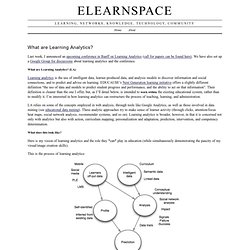
We have also set up a Google Group for discussions about learning analytics and the conference. What are Learning Analytics? (LA) Learning analytics is the use of intelligent data, learner-produced data, and analysis models to discover information and social connections, and to predict and advise on learning. EDUCAUSE’s Next Generation learning initiative offers a slightly different definition “the use of data and models to predict student progress and performance, and the ability to act on that information”. LA relies on some of the concepts employed in web analysis, through tools like Google Analytics, as well as those involved in data mining (see educational data mining).
What does this look like? Explore tags on Delicious. The Case for Nudge Analytics (EDUCAUSE Quarterly. Key Takeaways Developed as a concept in the science of choice, subtle interactions — or nudges — can influence people's actions without infringing on their freedom of choice.
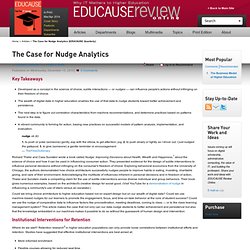
The wealth of digital data in higher education enables the use of that data to nudge students toward better achievement and persistence. The next step is to figure out correlation characteristics from machine recommendations, and determine practices based on patterns found in the data. A vibrant community is forming for action, basing new practices on successful models of pattern analysis, implementation, and evaluation. nudge vb (tr) 1. to push or poke (someone) gently, esp with the elbow, to get attention; jog, 2. to push slowly or lightly as I drove out, I just nudged the gatepost, 3. to give (someone) a gentle reminder or encouragement — TheFreeDictionary Could we bring choice architecture to higher education based not on expert design but on our wealth of digital data?
Erm0742. ELI7059. Social Networks in Action - Learning Networks @ UOW. Signals - Stoplights for Student Success. Research has shown that messages sent by instructors using the communication system Course Signals, inspire and motivate students who are not utilizing their time in class.
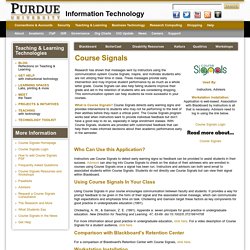
These messages provide early intervention and may improve student performance by as much as a whole letter grade. Course Signals can also help failing students improve their grade and aid in the retention of students who are considering dropping. This communication system can help students be more successful in your courses. What is Course Signals? Course Signals detects early warning signs and provides interventions to students who may not be performing to the best of their abilities before they reach a critical point. PassNote is a messaging tool created for those wanting to provide feedback to students – and, in particular, those using Course Signals. This video, designed with student viewers in mind, briefly describes how Course Signals works. Stats: Reading (the numbers) between the lines. One of the great things about working at a fast-growing web company with amazing engineers is all the cool products we get to develop — products, in some cases, that are truly revolutionary.
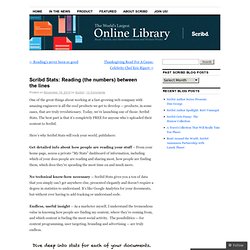
Today, we’re launching one of those: Scribd Stats. The best part is that it’s completely FREE for anyone who’s uploaded their content to Scribd. Here’s why Scribd Stats will rock your world, publishers: Get detailed info about how people are reading your stuff – From your home page, access a private “My Stats” dashboard of information, including which of your docs people are reading and sharing most, how people are finding them, which docs they’re spending the most time on and much more. No technical know-how necessary — Scribd Stats gives you a ton of data that you simply can’t get anywhere else, presented elegantly and doesn’t require a degree in statistics to understand.
Have fun discovering! Like this: Like Loading... Learning Analytics - Emerging Media Initiative. Visualizing Collaborative Knowledge Work Paul Gestwicki (Computer Science) and Brian McNely (English) Professors Paul Gestwicki (Computer Science) and Brian McNely (English) are developing a software system to enhance collaborative knowledge work, leveraging modern theories of rhetoric and writing, human-computer interaction, and the science of learning.
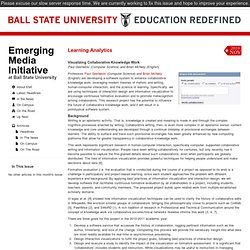
Specifically, we are using techniques of interaction design and information visualization to encourage continuous formative evaluation and to promote metacognition among collaborators. This research project has the potential to influence the future of collaborative knowledge work, and it will result in a prototypical software system. Background Writing is an epistemic activity. This work represents significant research in human-computer interaction, specifically computer- supported collaborative writing and information visualization.
There are three goals for this project in the 2010-2011 academic year: Northern Arizona University - University Advising. GPS is new for 2010-2011.
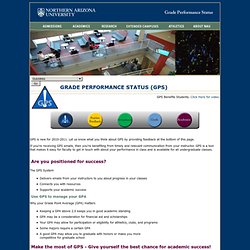
Let us know what you think about GPS by providing feedback at the bottom of this page. If you're receiving GPS emails, then you're benefiting from timely and relevant communication from your instructor. GPS is a tool that makes it easy for faculty to get in touch with about your performance in class and is available for all undergraduate classes. Are you positioned for success? The GPS System Delivers emails from your instructors to you about progress in your classes Connects you with resources Supports your academic success.